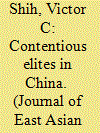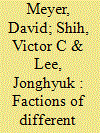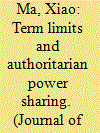|
|
|
Sort Order |
|
|
|
Items / Page
|
|
|
|
|
|
|
| Srl | Item |
| 1 |
ID:
145830


|
|
|
|
|
| Summary/Abstract |
We focus on the elite decision-making process in China, analyzing the formation of coalitions around particular policy options. We apply a framework that simulates collective decision-making processes (CDMP): the KAPSARC Toolkit for Behavioral Analysis (KTAB). KTAB facilitates the application of a Spatial Model of Politics, an open source model similar to Bueno de Mesquita's (1997) Expected Utility Model and the Senturion model (Abdollahian, et al 2006). KTAB provides a framework to understand logical consequences of subjective data inputs, enabling contrasting scenarios to be analyzed. We examine the interactions of actors' interests that drive China to reform its energy sector policies, in particular the structure of the Chinese National Petroleum Corporation (CNPC). In the case of private companies' entry into energy markets in China, we find that little reform is likely. The inertia of key actors holds back the potential for a significant opening of the energy sector. Despite the erosion of CNPC's political clout, there is little consensus for major reform to China's market position.
|
|
|
|
|
|
|
|
|
|
|
|
|
|
|
|
| 2 |
ID:
145831


|
|
|
|
|
| Summary/Abstract |
The history of leadership change in the Chinese Communist Party (CCP) exemplifies Pareto's notion of circulation of the elite. To analyze it we have compiled a partially ranked dataset of members and alternates of the Politburo Standing Committee, Politburo, and Central Committee for the 1st through 18th National Party Congresses. Quantitative studies of leadership change in the CCP have typically focused on the fraction of new members in each political body from one Party Congress to the next, but the existence of partially ranked data calls for a more subtle quantification of leadership change. Thus, we define a new family of metrics which consider change within each political body, the magnitude of such change, and the importance of each change to CCP structure and policy. We use two of these metrics to compute the distances between each pair of successive, partially-ranked leadership lists in our dataset. Our results capture important political developments from the irregular leadership change of the early years to the subsequent transformation of the CCP into a more institutionalized polity. This metric-based analysis also supplements our understanding of anomalous leadership transitions, intra-Party dynamics, and systemic change in the CCP.
|
|
|
|
|
|
|
|
|
|
|
|
|
|
|
|
| 3 |
ID:
145825


|
|
|
|
|
| Summary/Abstract |
The purges of former Politburo Standing Committee member Zhou Yongkang, former Central Military Commission Vice Chairman Xu Caihou, and the former head of the Central Committee Office Ling Jihua in 2014 re-excited a long-standing debate in the field of elite Chinese politics: how contentious is politics at the elite level? On the face of it, these purges, as well as the arrests of ninety nine senior officials associated with these three individuals and with other cases, seem to prove that elite politics remains highly contentious at the top (People's Daily 2015). This outcome was surprising considering that decades of institution building had taken place after the Cultural Revolution. However, proponents of institutionalized politics in the CCP argue that the leadership had a genuine desire to clean house, and that these arrests, even if politically motivated, instilled a renewed discipline in the party. Once the “bad apples” were eliminated, the leadership under Xi Jinping would have continued on the road of institutionalization (Li 2014). Cadre promotion institutions, regular meetings of the Politburo and its standing committee, party congresses, and retirement rules remain largely unaffected by the purges and will continue to ensure relatively harmonious decision making and predictable successions in the foreseeable future.
|
|
|
|
|
|
|
|
|
|
|
|
|
|
|
|
| 4 |
ID:
145827


|
|
|
|
|
| Summary/Abstract |
The literature on faction suggests that patrons in the party may recruit faction members on the basis of a broad range of shared traits and experience. Some scholars argue reasonably that with increasing specialization of officials, factions are increasingly dominated by those with shared work experience in a set of bureaucracies. Although this trend may be true in general, senior leaders may still recruit those with whom they share birth place and school ties into their factions. To investigate this, we first derive four reasonable ways of measuring factional ties as suggested by the literature. We then explore the factional recruitment strategy pursued by each reform-era (1978–present) party secretary generals of the CCP by evaluating the measures of factional ties which predicted their clients’ promotions to full Central Committee membership. Our results show that Hu Yaobang, Jiang Zemin, and Xi Jinping pursued broadly based factional recruitment strategies, while Hu Jintao recruited faction members mainly from work colleagues. We further uncover signs that the party institutions may allow deposed secretary generals some measure of influence over promotions even after their political demise. At the same time, strict retirement rules on lower level officials gave rise to a cohort effect that gave the general secretary greater influence over the promotion of alternate Central Committee members to the full Central Committee during their first term than in subsequent terms.
|
|
|
|
|
|
|
|
|
|
|
|
|
|
|
|
| 5 |
ID:
145829


|
|
|
|
|
| Summary/Abstract |
During recent party congresses in China and Vietnam, two highly anticipated candidates for promotion were sidelined. In China, Bo Xilai was arrested for corruption and stripped of his party membership. In Vietnam, Nguyen Ba Thanh remained a provincial leader with little opportunity for promotion to the Politburo. Existing arguments about promotions under authoritarian rule are unable to explain these outcomes. In particular, both candidates were competent and well connected. This cuts contrary to the expectations of both performance-based promotion and factional promotion theories. We argue that these candidates were sidelined due to a previously under-theorized factor in promotion contests—their ability to mobilize personal followings. Amidst a literature that has focused almost exclusively on intra-elite conflict, we argue that elite–mass linkages are critical. In particular, the public profile of top leaders is important for regime legitimacy and mobilization. However, when individuals become exceptionally well known they become threats to the single-party system. We test this argument on promotions in China's 18th Party Congress in 2012 and Vietnam's 11th Party Congress in 2011, using original data on Internet search queries and media coverage among contenders for promotion. Our approach offers new insights into the strategies authoritarian politicians use to stay afloat as well as the mistakes that sink them when competing for power under one-party rule.
|
|
|
|
|
|
|
|
|
|
|
|
|
|
|
|
| 6 |
ID:
145826


|
|
|
|
|
| Summary/Abstract |
Informal connections play an important role in regimes all across the world, but among China's political elite, it is particularly factional affiliation that is said to structure contention over who will rule and who will fall victim to a purge. This article identifies two approaches to measuring factional ties in the literature: the exploratory approach traces alliance ties through qualitative assessment of insider sources, while the structured approach uses publicly available data to infer factions from shared characteristics. The article combines the two by arguing that informal politics is better conceptualized as a process of alliance formation shaped by an underlying social (network) structure. Among the structured approaches, coworker networks best capture the latter, but this can be further refined by noting the number of instances of working together, or by taking into account promotions that have occurred while the two individuals were coworkers.
|
|
|
|
|
|
|
|
|
|
|
|
|
|
|
|
| 7 |
ID:
145828


|
|
|
|
|
| Summary/Abstract |
Term limits that effectively govern leadership transition play an important role in authoritarian power sharing. A fixed term and a pre-appointed successor – two crucial components of term limits – credibly commit the incumbent ruler to share power with other elites, and also allow the elites to monitor and coordinate against the ruler's transgression of the power-sharing agreement. While the successful adoption of term limits often requires an even balance of power among the ruling elites in the first place, once adopted it initiates an evolving bargain over allocation of political power among multiple generations of leaders that further keeps any one faction from dominating the others. I corroborate this argument using a biographical dataset of elite members of the Chinese Communist Party from 1982 to 2012. The findings suggest that the Party's incumbent leaders and their rivals (i.e., predecessor and heir-apparent) shared equal chances in promoting their associates—which proxy their political influence—and this pattern has become more salient since the 16th party congress, when the term limits that currently govern China's leadership transition became fully fledged. This result also sheds light on the role of informal, patronage-based promotion in the institutionalization of authoritarian politics.
|
|
|
|
|
|
|
|
|
|
|
|
|
|
|
|
|
|
|
|
|